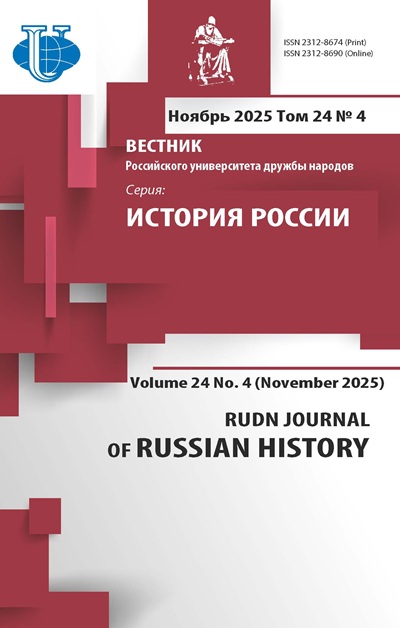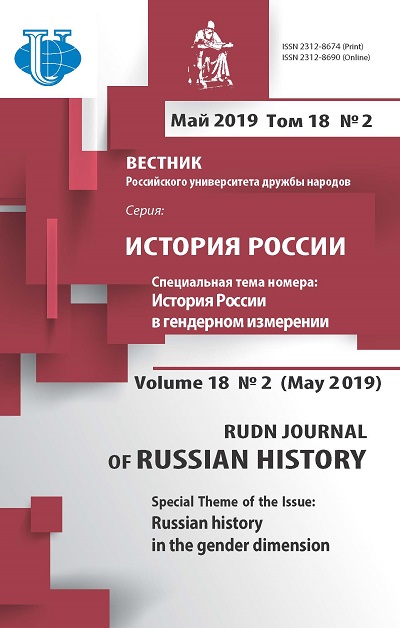«Безвластная власть»: статус женской домашней прислуги в России во второй половине XIX - начале ХХ в
- Авторы: Веременко В.А.1
-
Учреждения:
- Ленинградский государственный университет имени А.С. Пушкина
- Выпуск: Том 18, № 2 (2019): История России в гендерном измерении
- Страницы: 320-354
- Раздел: ЖЕНЩИНА В ТРУДЕ
- URL: https://journals.rudn.ru/russian-history/article/view/21198
- DOI: https://doi.org/10.22363/2312-8674-2019-18-2-320-354
- ID: 21198
Цитировать
Полный текст
Аннотация
В предлагаемой статье исследуется специфика социального положения женской домашней городской прислуги в пореформенной России. На основании широкого круга источников, включающего статистические материалы, публицистику, пособия по домоводству и эго-документы, автор делает вывод о наличии среди данной категории населения двух групп, принципиально отличавшихся по своему статусу в господской семье. В пореформенный период в России труд служанок не был нормирован, отсутствовали какие-либо гарантии со стороны работодателей как по условиям работы, так и на случай увольнения и потери трудоспособности. Значительный приток в город крестьянских девушек создавал гигантское предложение. Вместе с тем подавляющее большинство претенденток не имело никакого понятия о той деятельности, которую им предстояло осуществлять. Те же, кто смог выдержать несколько лет мучений, обзаводились не только профессиональными умениями, но обучались жизни в городе, способности защищать себя от посягательств. По мере роста образования крестьянской женской молодежи, знакомства ее с судебными учреждениями и активизации деятельности разного рода организаций, занимавшихся помощью служанкам в получении образования и организации найма, женская прислуга чувствовала себя все более защищенной и готовой отстаивать свои права. В результате несмотря на казалось бы гигантское предложение, в действительности подобрать в дом подходящую прислугу оказывалось крайне сложно. Имевшийся у хозяев выбор сводился к двум вариантам - покладистая неумеха или знающая себе цену и требующая учета своих интересов прислуга.
Ключевые слова
Об авторах
Валентина Александровна Веременко
Ленинградский государственный университет имени А.С. Пушкина
Автор, ответственный за переписку.
Email: v.a.veremenko@yandex.ru
доктор исторических наук, профессор, заведующая кафедрой истории России Ленинградского государственного университета имени А.С. Пушкина. Главный редактор журнала История повседневности.
196605, Россия, Санкт-Петербург, Пушкин, Петербургское ш., д. 10Список литературы
- Бурлуцкая (Банникова) Е.В. «…Прислуга, крайне здесь избалованная, живет по-своему». Домашние работницы в провинции пореформенной эпохи // Вестник Оренбургского государственного педагогического университета. Электронный научный журнал. 2018. № 4. С. 77-86
- Вахромеева О.Б. Социально-экономическое положение женщин в Санкт-Петербурге конце XIX - начале XX вв.: Дисс. … д.и.н. СПб.: [Б.и.], 2009.
- Веременко В.А. «Дура в доме» - женская домашняя прислуга в дворянских семьях России второй половины XIX - начала ХХ в. // Альманах гендерной истории «Адам и Ева». 2013. № 21. С. 241-273.
- Веременко В.А. Женская домашняя прислуга в России второй половины XIX - начала ХХ в.: состояние здоровья и факторы профессиональной заболеваемости // Известия Самарского научного центра Российской академии наук. 2017. Т. 19. № 3-1. С. 37-40.
- Веременко В.А. Хозяйка на кухне: адаптационные практики в жизни российской дворянской семьи во второй половине XIX - начале ХХ в. // Экстремальное в повседневной жизни населения России: история и современность (к 100-летию русской революции 1917 г.): материалы междунар. науч. конф., 16-18 марта 2017 г. СПб. : ЛГУ им. А. С. Пушкина, 2017. С. 315-323.
- Valentina A. Veremenko. RUDN Journal of Russian History 18, no. 2 (2019): 320-354
- Веременко В.А. На острие домашнего пространства: хозяева и прислуга в дворянских семьях России (XIX - начало ХХ в.) // Российская история XIX-ХХ веков: Государство и общество. События и люди. Сб. статей. СПб.: Лики России, 2013. С. 58-77
- Демидович Д.М. Доходные дома Петербурга: организация, взаимодействие с государственными и коммерческими структурами, повседневность (1870-е гг. - начало XX века). СПб.: РГПУ, 2018
- Каминский В.В., Веременко В.А. «Я вышла замуж за любимого…» Мемуары О.М. Меницкой-Зоммар (01.03.1874-31.01.1967) // История повседневности. 2017. № 1. С. 109-151
- Карпухина Ю.Е. Проституция среди женской домашней прислуги в Российской империи во второй половине XIX - начале XX вв. // Модернизация в России: история, политика, образование. СПб.: ЛГУ им. А.С. Пушкина, 2015. С. 101-105
- Карпова В.А. Работа трудовых огороднических ученических дружин в 1916 г. // История повседневности. 2016. № 1. С. 105-116.
- Карпова В.А. Повседневная жизнь участников трудовых ученических дружин в России (1915- 1916 гг.) // Вестник Ленинградского государственного университета им. А.С. Пушкина. 2015. Т. 4. № 3. С. 48-55.
- Куприн А.И. Яма. СПб.: Интерполиграфцентр, 1992.
- Ленская Л.Н. О прислуге. Доклад, читаемый во 2-ом женском клубе в Москве в феврале 1908 г.М.: [Б.и.], 1908.
- Лейкин Н.А. Прислуга из конторы // Хлебный вопрос. Юмористические рассказы. СПб.: тип.С.П. Худекова, 1896. С. 256-260.
- Мухина З.З. Русская крестьянка в пореформенный период (вторая половина XIX - начала ХХ века). СПб.: Дмитрий Буланин, 2018.
- Нестеров А.К. Война кухарки с барыней, или нашла коса на камень. М.: Универ. тип., 1866.
- Попов Н.А. Хозяева и прислуга. СПб.: [Б.и.], 1907.
- Поваринская В.В. О приучении девочек к домашнему хозяйству // Энциклопедия воспитания и обучения. СПб.: Захарьевская, 1902. Вып. L. С. 9.
- Самарина Л.А. «Мерзавцы все крали»: воровство среди домашней прислуги в России второй половины XIX в. // История повседневности. 2017. № 1. С. 77-89.
- Самарина Л.А. Артельная организация работы прислуги в России в конце XIX - начале XX вв. (на примере уставов артелей посыльных, перевозчиков и переносчиков) // XIX Царскосельские чтения: материалы международной научной конференции 21-22 апреля 2015 г. СПб.: ЛГУ им. А. С. Пушкина. Т. 1. С. 62-69.
- Сементковский Р.И. Среди отошедших (Из моих воспоминаний) // Исторический вестник. 1917. Апрель. С. 127-128.
- Степанова В.В. Распределение рабочих и прислуги по группам занятий и по месту рождения на основании данных первой всеобщей переписи населения Российской Империи 28 января 1897 года. СПб.: Типография Н.Л. Ныркина, 1905.
- Спиридонова Е. Отчего испортилась наша прислуга // Семья православного христианина. Сборник проповедей, размышлений, рассказов и стихотворений. СПб.: Типография Монтвида, 1906. С. 602-608.
- Яковлев А. Самарский Дом трудолюбия // Трудовая помощь. 1898. № 12. С. 620-622.
- Rustemeyer A., Siebert D. Alltagsgeschichte der unteren Schichten im russischen Reich (1861-1914): Komment. Bibliogr. zeitgenössischer Titel u. Ber. über die Forschung. Stuttgart: [S.n.], 1997.
Дополнительные файлы















